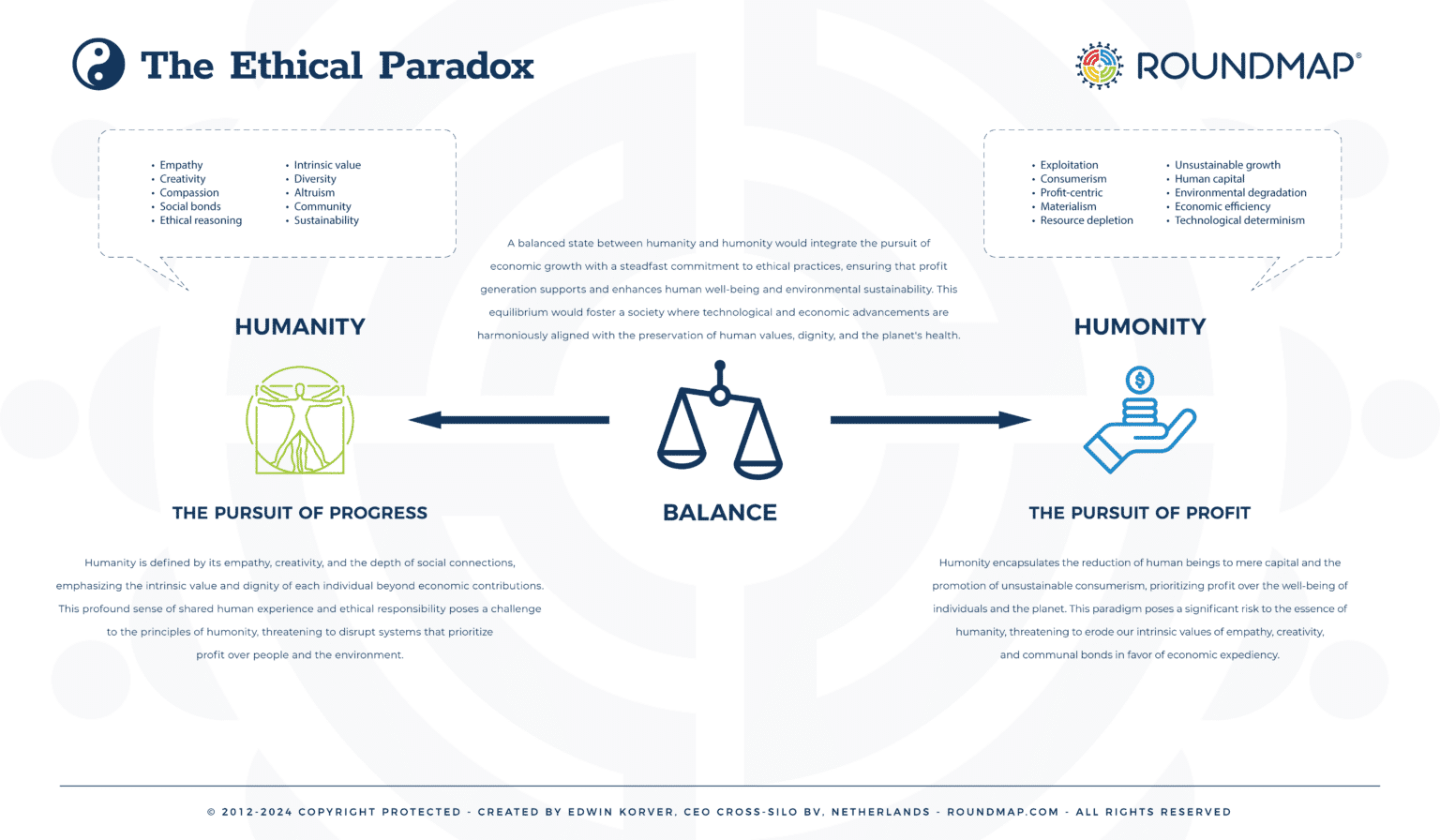Today’s ethical paradox extends beyond merely exploiting human potential for economic gain. It is deeply intertwined with an economic principle where growth necessitates increased consumption. This paradigm compels us to buy more, often under the guise of progress and satisfaction, yet it comes at a significant cost. It jeopardizes human well-being and has dire consequences for our planet—environmental degradation, waste proliferation, resource depletion, escalating debts, and more.
Such a system, driven by the insatiable pursuit of profit, raises fundamental questions:
- At what point does our quest for economic growth begin to cannibalize the very fabric of our society and the ecological balance essential for our survival?
- In this relentless drive for more, have we lost sight of what constitutes progress?
- How do we reconcile the demands of an economy predicated on perpetual growth with the imperative to preserve human dignity, promote sustainable living, and foster a harmonious relationship with our environment?
The challenge before us is not just to address the exploitation inherent in the concept of ‘humonity,’ but also to confront the broader implications of our consumption-driven model of growth. It invites us to reimagine progress, not as a measure of quantity but as a pursuit of quality—a quality of life that enhances human well-being and safeguards our planet for future generations.
Exploring the Shallowness of Humonity
Delving deeper into the concept of “humonity” requires thoroughly exploring its implications in the workplace and broader societal contexts. As we’ve framed it, this concept reflects the intersection of human exploitation and consumerism driven by profit motives, highlighting the ethical dilemmas and systemic issues within our current economic models.
The Foundation of Humonity
At its core, humonity encapsulates a dual phenomenon: reducing human beings to mere capital—assets to be optimized, managed, and, if necessary, expended in the pursuit of profit—and encouraging unsustainable consumer behaviors. This perspective views individuals not as ends in themselves, with inherent dignity and worth, but as instruments for economic gain.
The Workplace Dimension
In the workplace, humonity manifests through practices prioritizing efficiency and productivity over employee well-being and satisfaction. This can include but is not limited to, precarious employment conditions, minimal investment in employee development, and a lack of concern for work-life balance. Such an environment exploits human potential and diminishes the sense of purpose and fulfillment that work can offer, reducing it to a mere transactional relationship.
The Consumerism Aspect
Beyond the workplace, humonity drives a consumer culture that equates happiness and success with material possession and consumption. This relentless push for more goods and services, regardless of actual need or long-term impact, perpetuates a cycle of consumption that strains natural resources, contributes to environmental degradation, and often ignores the long-term well-being of the consumer. The ethos of humonity in this context is marked by marketing strategies and economic policies prioritizing short-term sales and growth over sustainable practices and ethical considerations.
Ethical and Systemic Implications
The ethical implications of humonity are profound. It challenges us to consider the moral cost of economic success and growth. By prioritizing profit over people and the planet, this paradigm risks the health and well-being of current and future generations and the sustainability of our global ecosystem.
Moreover, humonity raises questions about the systemic structures that perpetuate these practices. It invites a critique of economic systems that measure success primarily through GDP and stock market performance rather than indicators of social well-being, environmental health, and sustainable development.
Towards a Resolution
Addressing the concept of humonity requires a multifaceted approach. It involves redefining success in both corporate and societal terms, prioritizing sustainable and ethical practices over short-term gains. This includes:
- Redefining Value: Recognizing the intrinsic value of human beings and natural resources beyond their economic utility.
- Promoting Sustainable Practices: Encouraging businesses and consumers to adopt practices that ensure long-term sustainability over immediate profit.
- Investing in People: Creating workplace cultures that value employee well-being, development, and fulfillment as keys to long-term success.
- Regulatory and Policy Changes: Policies that discourage exploitative practices and encourage sustainable development and consumption.
The concept of humonity, with its dual focus on exploiting human capital and promoting unsustainable consumerism, presents a critical challenge to our current economic and social paradigms. By confronting this challenge head-on, we can begin to envision and work towards a future that values humanity, prioritizing ethical considerations, sustainable practices, and the well-being of all stakeholders in the pursuit of progress.
Exploring the Depth of Humanity
Exploring the depth of humanity as the natural counterpart to ‘humonity’ involves understanding the intrinsic qualities that define human beings beyond economic utility or consumption patterns. Humanity encompasses the richness of human experience, including our capacity for empathy, creativity, social bonds, ethical reasoning, and our inherent value as individuals.
Let’s consider the depth of human aspects:
- The Essence of Humanity: Humanity is rooted in the complex web of relationships, emotions, and experiences that define the human condition. It is about recognizing the inherent worth of every person, celebrating diversity, and fostering a sense of belonging and community. The essence of humanity lies in our ability to connect with others, to feel and express compassion, and to engage in acts of kindness and altruism.
- Creativity and Innovation: Humanity’s depth is also evident in our endless capacity for creativity and innovation. Unlike the narrow focus on productivity and profitability that characterizes humonity, the human spirit thrives on imagination, exploration, and the pursuit of knowledge for its own sake. From the arts to science, human creativity has enriched our world, advanced our understanding of the universe, and enhanced our quality of life in countless ways.
- Social Bonds and Community: The strength of human connections—our relationships with family, friends, and the broader community—is critical to our humanity. These social bonds provide support, meaning, and purpose to our lives. They encourage cooperation, mutual respect, and a sense of responsibility towards one another, reinforcing the social fabric that holds communities together.
- Ethical Reasoning and Moral Responsibility: Our capacity for ethical reasoning and moral responsibility distinguishes humanity. This involves reflecting on the consequences of our actions, making choices that respect the dignity and rights of others, and striving for justice and equity in our societies. Unlike the calculative logic of profit maximization, ethical reasoning prioritizes the greater good and the well-being of all members of society.
- The Inherent Value of Individuals: Central to the concept of humanity is the recognition of the inherent value of each person, irrespective of their economic status, productivity, or consumption habits. This perspective advocates for individuals’ rights, dignity, and fulfillment, emphasizing that everyone deserves respect, opportunities for personal growth, and the ability to contribute to their community meaningfully.
The Paradox and Its Implications
The juxtaposition of humanity and humonity unveils a fundamental paradox at the heart of modern society. It raises profound questions about the direction in which we are headed and the kind of world we wish to create. Can we afford to sacrifice the essence of our humanity on the altar of profit? How do we reconcile the demands of a competitive marketplace with the imperative to treat every individual with dignity and respect?
RoundMap's Vision in Navigating the Paradox
At RoundMap®, we recognize the gravity of this paradox and the imperative to address it head-on. Our mission is to guide organizations in breaking the cycle of humonity by fostering a culture of whole-system thinking, stakeholder-driven leadership, and cyclical operations. We believe in the power of sustainable business success that does not come at the expense of human capital but rather elevates it.
Charting a Sustainable Path Forward
The path towards resolving the tension between humanity and humonity lies in embracing values that prioritize the well-being and empowerment of people. This means cultivating environments where continuous learning, adaptability, and collaborative empowerment are not just ideals but foundational principles of operation. It requires a shift from short-term profit maximization to long-term sustainability, where success is measured not just by financial returns but by the positive impact on human lives.
The Call to Action
The paradox of humanity versus humonity is a call to action for leaders, policymakers, and individuals alike. It challenges us to reflect on our values, the decisions we make, and the legacy we wish to leave. By prioritizing humanity, we can forge a future where businesses thrive by enhancing, rather than exploiting, human capital.
At RoundMap®, we stand committed to inspiring and facilitating this shift. By championing whole-system transformation and empowering businesses to embrace their collective potential, we can navigate the complexities of our time with integrity, purpose, and a profound commitment to the human spirit.

Douglas Ruskoff, an American media theorist, writer, columnist, lecturer, graphic novelist, and documentarian offers an exciting perspective on this paradox:
‘Technology is not driving itself. It doesn’t want anything. Instead, a market expresses itself through technology—an operating system beneath our various computer interfaces and platforms often unrecognized by developers.
This operating system is called capitalism, and it drives the antihuman agenda in our society at least as much as any technology. Commerce is not the problem. People and businesses can transact in ways that make everyone more prosperous. If anything, as it’s currently being executed, capitalism is the enemy of commerce, extracting value from marketplaces and delivering it to remote shareholders.‘
Continue reading: We shouldn’t blame Silicon Valley for technology’s problems—we should blame capitalism
Author
-
Edwin Korver is a polymath celebrated for his mastery of systems thinking and integral philosophy, particularly in intricate business transformations. His company, CROSS-SILO, embodies his unwavering belief in the interdependence of stakeholders and the pivotal role of value creation in fostering growth, complemented by the power of storytelling to convey that value. Edwin pioneered the RoundMap®, an all-encompassing business framework. He envisions a future where business harmonizes profit with compassion, common sense, and EQuitability, a vision he explores further in his forthcoming book, "Leading from the Whole."


